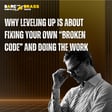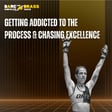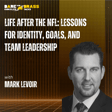Become a Creator today!Start creating today - Share your story with the world!
Start for free
00:00:00
00:00:01

LIVE from Cyber Marketing Con: What “Community” Really Means for Both Practitioners & Vendors
"Community" is getting bandied about a lot. What does it really mean, for both cybersecurity vendors and practitioners? This week's episode is a roundtable discussion recorded LIVE at Cyber Marketing Con in December 2024! The panel features Dani Woolf, Ben Siegel, Bronwen Hudson, Elliot Volkman, and BKBT's George K.
Some key topics covered:
- Community is not something you can just spend money on.
- Successful communities are affecting change.
- You can't expect instant ROI from community building.
- Be passionate about your community's mission.
- Listen to your community; they will guide you.
- Communities are about adding value, not extracting.
————
👊⚡️BECOME A SHOW SUPPORTER
https://ko-fi.com/bareknucklesbrasstacks
For as little as $1 a month, you can support the show and get exclusive member benefits, or send a one-time gift!
Your contribution covers our hosting fees, helps us make cool events and swag, and it lets us know that what we're doing is of value to you.
We appreciate you!
Transcript
Introduction to the Episode
00:00:06
Speaker
Hey listeners, George K here. This week's episode is a roundtable discussion recorded live at Cyber Marketing Con at the beginning of December 2024. It's a discussion around community.
Defining 'Community'
00:00:19
Speaker
It's a loaded term these days, but it's about community, what it means, how it's being overused and more.
00:00:26
Speaker
The roundtable includes myself, Danny Wolf from Audience First, Ben Siegel from The Cybernest, Bronwyn Hudson from Reveal Risk, and Elliot Volkman, host of the Adopting Zero Trust and GRC Uncensored podcasts. We'll be back next week with the newest interview for 2025 with Stacey Loki Day. Enjoy!
00:00:47
Speaker
Hello, everybody. Welcome. I don't know what show this is, but we are here on a panel at Cyber Marketing Con. My name is Danny Wolf. I am the co-founder of Cybersyn
Panelist Introductions
00:00:55
Speaker
Apps. I am here with my esteemed panel. Yeah, I'm George Committi. I am the head of community and events at the CESA Society and also one half of the foul-mouthed cybersecurity podcast Bare Knuckles and Brass Tax. I'm Bronwyn Hudson. I'm the marketing lead at Reveal Risk at the moment. I'm Ben Siegel, founder of the Cyber Nest and co-founder of the Cybersyn Elliot Volpin, let's just say the producer for Create KS, which is a bunch of podcasts, and also the director for Microsoft Threat Intelligence. Right on. Let's get into it. OK, so we talked before Cyber Marketing Con, and we're like, let's do a podcast. And George, what are we going to talk about? And you said you wanted to talk about community. Correct. OK, so what are we talking about?
00:01:38
Speaker
Well,
Costs and Challenges of Building Communities
00:01:39
Speaker
I wanted to bring that up because one, we have all been involved in either building or maintaining or creating community. Bring team of community building right here. and but and But also because when we all started doing that, one, we did it before it was cool, but two, um it is now entered into the common parlance. Like everything is community driven, community this, community that. So I guess I am posing the question to you all.
00:02:05
Speaker
What does that really mean? Is it being used properly? And what does it actually take to create and maintain? Because I hypothesize that it's sort of getting bandied about because there's value in it, but I am pretty confident that the true cost and time and energy and maintenance is is not well understood. Yeah. Okay. Let me just Google two words that you said, because I don't understand that. What? No, it's words. I don't even remember. I don't even get it. Who wants to start? Anybody? let's Let's start with that guy. yeah that's a lot you did a talk You did a talk on Reddit today. but but Yes, I did do a talk. Okay, so let's start with let's start with um we'll start backwards. yeah
00:02:57
Speaker
What does it take to create a community or you can define community as you've come to understand it? Yeah. So
Organic Community Formation vs Artificial Creation
00:03:05
Speaker
i I'll give you a philosophical answer. i like Community is not something that you can just spend money and make it appear. yeah Just like everything else in our world, you cannot just build something and they will show up and magically you know, unicorns and candy are going to be available from a corporate side. So I'd say the argument is, yes, corporations, businesses, up we all get our paychecks from, they can help facilitate that, invest in and get that there.
00:03:31
Speaker
But community, as it lives within the cybersecurity world, it kind of happens naturally. Even with like this conference, Cybersecurity Marketing Conference, ah is hosted by a bunch of people. And it started with 10 people who had shared ideas and missions and all that. That is where community comes from, and it has to arguably happen naturally. So if a company is starting with just like, I want to build a community because it's going to be great for marketing and sales, that is a horrible approach. And you're just already going to fail out the gate because you're spending a ridiculous amount of money on something with very little initial return. It reminds
Key Components of a Successful Community
00:04:04
Speaker
me of back in the day when SEO just kind of started. They're like, oh, yeah, it's going to be great returns immediately. Absolutely not. It takes months and months and months. And you get a little nugget and then you're like, sales, go attack it, destroy it. That's how it's hacked.
00:04:18
Speaker
I think about community boiled down into three words. for For me, it's mission, trust, and then incentive. So mission could be, hey, we you believe in the same thing or we want to see the world the same way. Mission could be like, hey, we're doing the same job. And so naturally communities form because it's like, hey, I know that this person is going through the same challenges as me, looking at the same solutions. Trust, I think, is probably the most important thing in security and largely why to your point, George, community is throwing around so much because it is a peer network. It is trust. And traditionally, it has to come from the people who are doing the job every day to drive that. And so as organizers, it's not so much that we have to do the same job, but we have to understand the job and align the right
00:05:08
Speaker
models the right incentives so that they can facilitate that knowledge transfer in the way they want it. And I think that's really important because when you force how it should be done on a group, when you don't experience what they go through, it's not going to be taken well and it's not going to be mutually beneficial. So I think those are the three things. The incentive piece is also very important.
00:05:30
Speaker
because if they don't feel like by giving, they're going to receive, then it's one sided. And oftentimes you get high engagement and then it tends to fall off because the people are engaging or waiting for others. And they're like, wait, why am I the only ones contributing, sharing, helping others?
00:05:48
Speaker
you know There's no continual feedback loop. I think that's very wise. And I think one thing that to me seems unique about the cybersecurity industry is that the community actually already exists.
Existing Cybersecurity Communities
00:06:00
Speaker
it's It's available in so many different platforms like Reddit, but also in different sub-genres the work that we do. So when as a community sort of like leader, you get told to go create community,
00:06:12
Speaker
I have a mild sort of distaste for that, because I'm like, it's already there. yeah either Either you're creating a path to it, or you're creating a path from your business to it, which is the kind of cringy part. But really, it's about accessing the community. right It's not necessarily about like creating and a novel way for people to communicate with one another. There's a bajillion ways that we can be doing that, and the people are already doing that. so i think that's For me, that's where that moment of ah if cringe comes in, is thinking that we're doing something unique.
00:06:40
Speaker
Yeah, it's like an intention. Intention is sort of that flip side of incentives, you know, like ah but if we're just breaking down the word, like to commune, it's like a group of people have already come together around a shared interest or a problem, whatever, whether it's the marketing society or cybersecurity leaders. And so if you come at it with the intention, like, I am creating this to exploit it later. like Yes.
00:07:05
Speaker
It's trying to grow a garden on AstroTurf. yeah you exist You can lay it out and it might look great, but it's really hard for you to create it and sustain
Natural Growth of Communities
00:07:14
Speaker
it. I can't tell you how many people have come into the CISO Society and said, oh, yeah, I'm in a lot of CISO groups. So this is fine. I don't know. It's like one of a billion they're going to join.
00:07:25
Speaker
a week later, they're like, this is way more active. Like the last one I was in said like April 22 was like the last time somebody had posted something. So unless there is like, I don't feel like I am cultivating anything in there. I'm more like connecting dots, like because I'm in it every day, it's more like, oh, hey, I saw you posted that you're hiring for this. Did you also see that somebody had posted the resume of an engineer that's kind of, and that's just my job is like connect those dots, but like they are going to commune on their own for their own purposes. Also keeping all the trash out though. Yes. Yeah. Yeah. Yes. Yeah. Part of the gardening too. Yeah. Yeah.
00:08:06
Speaker
it's It was George's. says like you know They're building a garden on AstroTurf. I think you can evolve them before they're there. yeah Yeah. I think it's about connecting the dots and coming and sharing interest and mission, but beyond that, I think it's about change.
00:08:20
Speaker
because people i mean There's access to so much information out there, but people come together to affect change like because they're tired of the status quo what's ah of what's out there. so They're coming to these safe spaces to to progress in some sort of you know use case or scenario or problem, right? um At least the successful communities, I will say. um That's a very important keyword here, successful communities are affecting change. Well, I think it's tricky. We talk about building an additive business model versus extractive, right? i think
00:08:54
Speaker
wait fiber google that again now you had there We're at the Cyber Security Marketing Society's conference, so it seems right at like what is the typical cybersecurity event is gather a bunch of security people with certain titles and do a room more than with whatever cigars, whiskey, expo halls, speakers in the background, strip mine their data and sell it off to sales reps.
00:09:18
Speaker
That's extractive, right? That's like that feeling of being used. But if you're trying to build an additive business model, which is sensibly a community is, you just have one litmus test, which is, is this adding to members' lives or is it attempting to transact? But
Additive vs Extractive Community Models
00:09:33
Speaker
that goes back to trust, because if they're trusting you with their data, then... Right.
00:09:38
Speaker
They'll just walk away if you start extracting from them, like that you will just have, sure, you can build it up to a certain critical mass, and then once they start feeling that, it'll self-detonate. Yeah. Yeah. We'll just add upon that. We are also in a very strange industry. Yes.
00:09:55
Speaker
True. Our people are a little paranoid, maybe. Some of their hobbies might involve prepping. So like there are different attributes that we have to can consider when it comes to community building because you don't get a second chance. Yes. A thousand percent. You grow trust. You're gone, especially in your space with CISOs. And then they tell all their friends. You're gone, gone. Yeah. Can I ask you a question? Because you mentioned ah you know successful communities. But what do you think makes a community successful?
00:10:26
Speaker
constant finger on the dial, listening, um as a moderator, yes. Yeah, listening. Listening is the biggest thing. um Facilitating engagement, um it's so hard. I think community building and field marketing are two very difficult um roles in a marketing a function. um You're like trying to create an experience, but not have it be overt. Yeah, yeah.
00:10:55
Speaker
They're like, create the conditions for an experience as the better way, rather than like puppet mastering the experience. And it has to come, work I think, you to your point, it has to come organically. It's like you're nurturing this gentle, delicate organism that will constantly grow and it has to has to come organically, in my opinion. um Yeah, it's it's not an easy task, but once you kind of hit the sweet spot, you know you kind of see it take off. It's really rewarding. yeah Well, let's talk about, you said organically and you said time. Let's talk about time. How long does it take to grow? Good one. That's a good one for Ben too. I don't know. I don't know if there's like a perfect answer. You know, I, yeah, maybe that's the answer. I think it grows small. I think it has to start small, but like not, it's, you can't be a community of one, but you know, cyber and I started as 15 turned 50 and naturally it grew based on referrals and word of mouth and sharing and you know,
00:11:53
Speaker
creating avenues where people can share and feel comfortable to share. um I think the the better question is, can a community be too big? you know like At some point, does it have diminishing returns? um And I think that, George, your point of additive or extractive, like I think you nailed it because if it's additive, then you're not doing things at the expense of the members. You're doing it because it helps them or very much they're part of the value creation. Like that's how we like to think about it is what are the things that we do that
00:12:28
Speaker
do not make them the product, but make them very much part of whatever product we're creating that benefits them, whatever that might look like. um So I think that's the hardest part is finding where two sides, whatever it is, whether it's like your audience and then your customer, you those two things are not at on. And I think that's where it's been so challenging is we've looked at our members of community as the products versus actually they're the ones who are the reason this exists. So how do we align incentives or how do we you know be additive in the things that we do, whether it is product, because ultimately we have to grow, we have to find avenues to monetize what we do in order to continue to build community. yeah Yeah, I think that the TLDR as I would tell anyone who
00:13:20
Speaker
raised their hands in one of the panels here of they are planning to start a community. It will take so much longer to see. It will take and it will be it'll be slow and then it'll take off.
00:13:34
Speaker
Maybe yeah so. And then you just got it. There's there's a lot of letting go. Right. Like to your point, the see see society has grown has doubled year over year. Right. So it was like 600. It was like 300 to 600 and we'll end the year with over 13. But.
00:13:52
Speaker
you can't expect that all 1300 are engaging at the same level. I see the super users sort of, I see some people come to events, but they're never in Slack probably because it were, they can't get it on their machine or I don't know, but you kind of have to, you have to really let go of the control yeah and they're just going to get out of it what they want. So.
00:14:14
Speaker
actually um it Just because you don't see them actually engaging. I mean, they're not. you Yeah, I have been told by many that they are silent lurkers. and that That is like the biggest cool people, like yeah minimum 70%. Yeah, totally. So the engagement, the content that's being created by like 5% of your people, yes yeah that's the value of everyone else. yeah What are the kind of so success metrics that you're looking at?
00:14:37
Speaker
I know that's a baby loaded question or I don't know. I think the success metric is how many people are engaged of the total. Yeah. Because I think to your point, yes, people might be getting value in receiving it, but I like to think about things as like, are you guys familiar with like tragedy of commons where like yeah everyone thinks that their impact is insignificant. Well, if everyone thinks that then actually, you know, really everyone is in in a shared mindset where like nothing progresses and no one's engaged. um So I do think that non-engagement is a detriment to community and it's really difficult to get everyone to
00:15:19
Speaker
engage on their terms in the way they want it. um And so I think that's the unanswered question for me oftentimes is, how do you serve every single person in the same way that they want to be serves? Or do you just find the folks who are like your core, highly engaged and serve them and, you know, to your point, like the folks who benefit will continue to benefit, but, you know, they
Measuring Success in Communities
00:15:44
Speaker
might not have a seat at the table and how you organize community or how you serve them.
00:15:49
Speaker
um because then you don't really know who you're serving if ah you don't know exactly like who are your loyal be a sort of followers. I think that's the challenge of it too. I was just in Jana's session about community and she told a story, hearing that from somebody is totally a success metric, right? Like hearing from a person in the community that they want to get back into it and that it's valuable. That's like direct. Yeah, I think if you're in it,
00:16:18
Speaker
There's no clean way to track, but there are a number of members that I will see comment ah less frequently than others. But when they do, it's maybe it's after a few weeks or a few months. But to me, it's sort of like a sign that they're checking they're the silent majority, as it were, or they're in there. um But I think it is about creating a space where they feel comfortable in that behavior, that they don't feel like a pressure to contribute. um But it's also a place where you can be a mid market CISO and feel comfortable sharing advice with a fortune. fight Like all the egos are at the door.
00:17:01
Speaker
yeah all this All the bluster that's on LinkedIn has gone and like you feel it like you're among peers, which goes back to commune and trust, um but that's it's hard to maintain.
Supporting the Podcast
00:17:14
Speaker
I mean, you have to slap a couple of risks only occasionally, but for the most part, the community has successfully like policed its own behavior in ah a more productive use of that word than than ah than a negative one.
00:17:29
Speaker
um Hey listeners, if you dig the snark, the stories, and the big swings we take, we'd appreciate your support. You can now become an official supporter of the show. You can send us a one-time gift or sign up as a member to provide ongoing support. Memberships start for as little as $1 per month. Just follow the link in the show notes. Each membership tier comes with a unique set of benefits, including exclusive discounts to the BKBT swag shop and even advisory services for your team.
00:18:03
Speaker
So really, for less than you'd pay for one cup of coffee per month, you can support the show. It covers our hosting fees, helps us make cool swag, and it lets us know that what we're doing is valuable to you. Many thanks to listener Elizabeth Ramirez for her recent pledge of support. We'd love to have yours too. Now, back to the show.
00:18:32
Speaker
for me, success is they've made a change either in mindset or in their day to day.
Defining Success through Member Changes
00:18:40
Speaker
Like the tangible. Yeah. Like a routine. Yeah. Yeah. Yeah. Yeah. I mean, engagement is awesome. We're getting, you know, feedback. Oh, you've helped me blah, blah, blah. or You're awesome. That's amazing. Um, but hearing that either because we've engaged and because I've listened to you know the podcast or read your emails.
00:19:03
Speaker
I now don't want to quit my job and I want to apply what you've told me to the business is like yeah yes the point. And then I want to add also that community doesn't necessarily mean you have a physical group. right Like it could be your tribe, quote unquote, who's closing you on LinkedIn or like your email database or something like that. So I just want to but put out there. I love that you put it that way because then maybe it'll spend less cycles on like really expensive community platforms. Yes, yeah and I've signed everything out on there the other side, by the way, so you don't need a platform. I agree with you. Amen. yeah yeah I mean, I've heard, or don't I think it's also an element of self-examination. So going back to one of the other questions is like, here is our vendors overusing that word? I think so. Elliot, to your point about like, are you thinking of it as like a sales channel?
Misuse of 'Community' by Vendors
00:19:55
Speaker
I've had these giant publicly traded companies be like, well,
00:19:59
Speaker
We also have our own community and I was like, Oh, you mean that LinkedIn group that no one posts? ha like still exist and um They do, but it's also like, let's, let's walk it back. Let's think about that logic. Like you're a vendor. You've created a LinkedIn group. No one is going to go on there publicly and talk about their problems yeah and like open social media. And they're definitely not going to do it.
00:20:21
Speaker
with a vendor looking over their shoulder. I just think like the level of thought, like you gotta work backwards from like intention. And if it gets to like, if we create this group, we can sell to them.
00:20:35
Speaker
it's I've never seen it work. Yeah, no ah I do agree with that I also want to throw out one bit is that like there's a vast difference in success metrics of like People like us who are trying to build me like not from a business-oriented perspective But like well his CS our customer success is like the easiest route like are you reducing tickets also? That's like the short answer. Yeah, it's like their shortcut. They should be focused on I But there is a philosophical element that comes up to this, and I apologize if I can get a little bit over exception excessively nerdy. 12 years ago, I did publish a master's thesis on this, and if you really want to understand how to advance people and get people engaged, just map this to Maslow's Hierarchy. and end and Yeah. this Everybody of resounding this? Yeah. Exactly.
00:21:18
Speaker
Why would someone engage versus the Lark and consume information? And you can more or less see that it just follows the same thing. Same but with looking at Maslow's hierarchy of needs. So a lot of people will live in that top level where you're just trying to understand and get information. Those like crazy power users who are you know, trying to get a platform that's part of like the ego and you're deeper, you have that expertise and information. So that's just like the easiest way to explain from a film philosophical perspective. sick out And we will link Elliot's thesis paper. very we We will process it into chat.
00:21:55
Speaker
but I feel like a new word needs to be created. That's when you like vendors look at creating community. because Yeah. I feel like there's just this word that hasn't been coined yet because on one end like communities when people are helping each other and like community powered is when like they're the ones driving.
00:22:13
Speaker
the validation or they're the ones that are like sharing the knowledge versus like traditional, which is like people subscribe and you know, whatever the entity is, I'm the expert and you're taking my advice. yeah um At least that's how we like to think about as cyber nests is like, we're not the expert, we're the our members are the expert and yet we're just facilitating that. But I do think it gets confused around community versus audience. yeah A lot of things are audiences and it's totally cool and great to be like, we have a great engaged audience and this is how we serve them. And there's elements of community here, but it's it's really like a core audience. And for vendors specifically, like
00:22:53
Speaker
If community to your point, George, is how do I use this as a channel? Well, I think it's misguided because really your customers are probably not going to talk in your community right negatively. right They'll go to other avenues to do that. Yeah. I think you're talking like at that point, you're either looking at customer advisory board because I i want new ideas from the front line.
00:23:16
Speaker
or
Community Engagement vs Customer Advisory Boards
00:23:17
Speaker
you're talking user group, like you're um you're mature enough that it would be really cool as the people have been using your product for three years are educating new users. That's powerful. I think that's the primary use case in this community is like you're- But building net new audiences to sell to is like, ah that is a Sisyphean task. Totally. So I don't know if vendors should create community, but I do think they should definitely create customer advisory boards. Yes. and Yes. and but size Is a customer advisory board a community? I was just thinking. Oh, really? yeah um just It can be. It tends to be smaller, but there is there's more of a value exchange there. Yeah, totally. like they're They are coming to that on your behalf. yeah It's less the like sort of natural... ah They would not have found each other like, oh, we're all customers of these people. There's less.
00:24:14
Speaker
and Yeah. Apologies. Yeah. Yeah. So intentionally benchmarking and things too, i think there is more of a shared... Well, so I think, Ben, to your point, the way I have heard it spoken by the CMOs I respect the most is they are saying the questions that the community is the North Star for them, not to create, but they have asked themselves every time they think of a campaign or a product release or whatever, how they're working with sales is like,
00:24:48
Speaker
How are we showing up in communities that we're not a part of? Which is basically saying, are people shit talking us or are they singing our praises? I see that every day and it is an amazing experience if somebody says, hey, does anyone have a firm and people just.
Marketers' Role in Existing Communities
00:25:02
Speaker
I mean, that is the kind of earned recommendation that marketers dream of. But the legwork to get there is brilliance in the basics, just service delivery. ah Being you know human. Yeah, like they've had a good experience ah and they're willing to stand up. So I think if you thought of now, the present day, sure, you can go out there and you're like the funnel or the customer journey or whatever.
00:25:29
Speaker
But know that whether it's a WhatsApp group between 20 people or a Slack group of 1,300 people talk about you and you're not there. So how do you show up? What is your reputation essentially?
00:25:42
Speaker
I don't know if I'm going to call it reputation marketing because that's what marketing was supposed to be, but I think it's worthwhile that a lot of people who are at this converse may or may not know how they are being spoken about yeah in those areas. Yeah, very true. Quickfire, tactics, like what what do we want to talk about on tactics? Don't create community
Best Practices for Building Communities
00:26:03
Speaker
from scratch. Yeah, totally. Absolutely. like Yeah. Best practices or tips if you want to start a community or or grow grow an existing one, right? What would be... Give, don't take. Yeah, give, don't take.
00:26:15
Speaker
um prepare for a very long game. You're going to have to set expectations. So like CEO comes to CMO and says like, Oh, I hear this thing about our community. Like you need a level set very quickly. That takes a very long time and probably not instant ROI. So like, where do you really want me to focus my energies? If I were the CMO, I would say like, you really want me to focus our energies on not showing up like an asshole in those communities. right So like, let's fix those things first.
00:26:45
Speaker
ah Passion, be passionate. like Whoever's moderating or or managing, like you have to be passionate about what it is your mission is. Then I would say just persistence, persistence, persistence. like That's the two. Just remain persistent because it's up and down, up and down. and like you don't see you know You see growth happen in spurts. It's not yeah consistently ah hockey stick. It is hockey stick. but I would also say like very clear and transparent communication. so To your point,
00:27:15
Speaker
it If we started in January of 2024 of 600, that was enough for Jason, our founder, to know most of yours. At 1300, that's not no longer possible. And also we are making decisions on the back end about like what kind of activities we want to do. And now it's incumbent upon us to go to the community and say like, this is what we are thinking of. does this And you just have to have that constant value exchange. You can't just sort of like,
00:27:41
Speaker
create new features or new whatever from scratch and like not have prepared people. Like they've come to trust you. So you have to, you kind of have to walk towards them as well. Yeah. What about you Ben? I think for me, it's just radical transparency. and Like people are smart and go like, they can sniff out the bullshit. yeah So you know be authentic, seek to understand, ask for feedback. If things change, validate it. Don't just assume that it's understood.
00:28:15
Speaker
You know, because not everyone's thinking about what you're doing, right? They're in their own world. So I think you have to over educate as well. Yeah. You're explained. Yeah. um We kind of assume people get it or that we assume that they they share your vision. Right. And you have to continue to validate it and be transparent about how you're thinking about it. Seek feedback and then iterate on it. Yeah. Because it's not going to be perfect and it's constantly changing.
00:28:45
Speaker
Alright,
Internal Alignment and Listening to Communities
00:28:46
Speaker
I've got... one and a half answers. So the first is you need absolutely clear internal alignment. If you're a business and you're trying to do this stuff, I have been in those shoes and it has failed miserably. It sucked because I loved the concept of what was being offered on the table, but because of internal pushback, it just, it flopped and died. The other piece is if you're a smaller organization, I am fully aligned with you. It's not worth building community. So instead,
00:29:15
Speaker
If you have the ability, Reddit, whatever, ah monitor existing communities, either through technology, yeah whatever. It's out there, right? Yeah, so exactly. So just see what's happening and just shut up and listen is the answer. Love the last one. Me too.
Panelists' Community Links
00:29:33
Speaker
Where can everybody find your communities? Let's do the shameless plug. Let's see society.com.
00:29:41
Speaker
Well, I have like five million. So audiencefirst.fm, obviously, ah that's been going on for a while. Check out cybersynapse.io where we have the cyberbrain now. It's a community, essentially, and I'm learning how to grow new community, which is fun. ah And I'll leave the last one to you.
00:29:59
Speaker
ben but Okay, brought right on. ah If you're a person who is queer in cyber, come join the private LinkedIn group at Cyber Security on LinkedIn. I love the name. all yes If you're an internal security professional in mid-size and large enterprise, you can join the Cyber Nest at cybernest.com.
00:30:19
Speaker
You're really going to make me say it. Yup. Yup. Gross. I'm unfortunately January the Internet. I can't read it. I can't read it. Because the CSAP is already that I just booted up again. um But also, you know, run Adapt and Zero Trust and GRC Uncensored and we'll maybe decide on a community if we feel like there's value. But we do have the GRC subreddit and there's community there. But yes.
00:30:45
Speaker
All right, everybody. So this has been another episode of I Don't Know What Show This Is, but thank you for joining. And I hope this ah this episode was helpful for all of you who want to build a community. Reach out to all of us. We're available on LinkedIn and email and whatever channel you're surfing on. So thank you. Party on. Yeah. Rock on.
00:31:06
Speaker
If you liked this conversation, share it with friends and subscribe wherever you get your podcasts for a weekly ballistic payload of snark, insights and laughs. New episodes of Bare Knuckles and Brass Tax drop every Monday. If you're already subscribed, thank you for your support and your swagger. Please consider leaving a rating or a review that helps others find the show. We'll catch you next week, but until then, stay real.
00:31:35
Speaker
Uh, we should, we never did an intro, so we should so use our last two minutes to just use from zero. Okay. So we'll scratch that in. You can go first. No, you do it. You convene this here. ah All right. I've been talking all day. I need to shut up at this point.



















